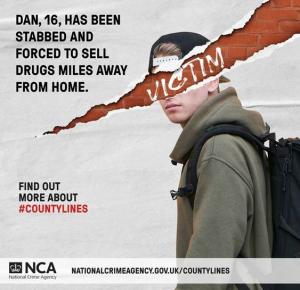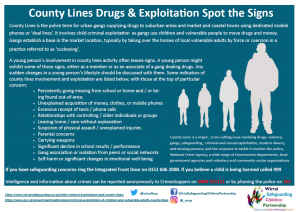County Lines and Criminal Exploitation
What is County Lines
‘County Lines’ is a term used when drug gangs from big cities expand their operations to smaller towns, often using violence to drive out local dealers and exploiting children and vulnerable people to sell drugs. These dealers will use dedicated mobile phone lines, known as ‘deal lines’, to take orders from drug users. Heroin, cocaine and crack cocaine are the most common drugs being supplied and ordered. In most instances, the users or customers will live in a different area to where the dealers and networks are based, so drug runners are needed to transport the drugs and collect payment.

Exploitation of young and vulnerable people
A common feature in county lines drug supply is the exploitation of young and vulnerable people. The dealers will frequently target children and adults – often with mental health or addiction problems – to act as drug runners or move cash so they can stay under the radar of law enforcement.
In some cases the dealers will take over a local property, normally belonging to a vulnerable person, and use it to operate their criminal activity from. This is known as cuckooing.
People exploited in this way will quite often be exposed to physical, mental and sexual abuse, and in some instances will be trafficked to areas a long way from home as part of the network’s drug dealing business.
As we have seen in child sexual exploitation, children often don’t see themselves as victims or realise they have been groomed to get involved in criminality. So it’s important that we all play our part to understand county lines and speak out if we have concerns.
Here are some signs to look out for that can suggest that someone you know might be involved in county lines activity.
- Are they always going missing from school or their home?
- Are they travelling alone to places far away from home?
- Do they suddenly have lots of money / lots of new clothes / new mobile phones?
- Are they receiving much more calls or texts than usual?
- Are they carrying or selling drugs?
- Are they carrying weapons or know people that have access to weapons?
- Are they in a relationship with or hanging out with someone/people that are older and controlling?
- Do they have unexplained injuries?
- Do they seem very reserved or seem like they have something to hide?
- Do they seem scared?
- Are they self-harming?
How do you know if County Lines drug dealing is happening in your area?
Some signs to look out for include:
- An increase in visitors and cars to a house or flat
- New faces appearing at the house or flat
- New and regularly changing residents (e.g. different accents compared to local accent)
- Change in residents mood and / or demeanour (e.g. secretive / withdrawn/ aggressive/ emotional)
- Substance misuse and/or drug paraphernalia
- Changes in the way young people might know dress
- Unexplained, sometimes unaffordable new things (e.g. clothes, jewellery, cars etc.)
- Residents or young people you know going missing, maybe for long periods of time
- Young people seen in different cars / taxis driven by unknown adults
- Young people seeming unfamiliar with your community or where they are
- Truancy, exclusion, disengagement from school
- An increase in anti-social behaviour in the community
- Unexplained injuries
What to do if you have concerns
The best advice is to trust your instincts. Even if someone isn’t involved in county lines drug dealing, they may be being exploited in some other way, so it’s always worth speaking out.
You can speak to your local police by dialling 101, or in an emergency 999.
If you would rather remain anonymous, you can contact the independent charity Crimestoppers on 0800 555 111.
If you notice something linked to the railways, you can report concerns to the British Transport Police by texting 61016 from your mobile. In an emergency dial 999.
If you are a young person who is worried about your involvement, or a friend’s involvement in county lines; a good option is to speak to an adult you trust and talk to them about your concerns.
You can also call Childline on 0800 1111. Childline is private and confidential service where you can talk to specially trained counsellors about anything that is worrying you.
Alternatively, speak to a children and young people’s service like Catch 22. They work with children and young people of any age to help get them out of situations they’re worried about, and have helped lots of children and young people involved in County Lines.
Law enforcement response
Tackling county lines, and the supply gangs responsible for high levels of violence, exploitation and abuse of vulnerable adults and children, is a priority for UK law enforcement.
Law enforcement collectively has been stepping up its response, working to identify and take effective action in areas of the country with the most significant problems.
To enhance the law enforcement response still further, a multi-agency county lines coordination centre has been established, bringing together officers from the NCA, police and regional organised crime units to develop the national intelligence picture, prioritise action against the most serious offenders, and engage with partners across government, including in the health, welfare and education spheres, to tackle the wider issues.
In addition to helping the NCA and policing partners to work together more effectively and deliver a more comprehensive response to the county lines threat, the centre will assist the development of a whole-system, multi-agency approach which is vital to ensuring that vulnerable people are identified and safeguarded, understanding factors behind demand for drugs, and recovering proceeds of crime.
Further information:
If a child or young person is at risk of harm, abuse or neglect please report it to the Wirral Central Advice and Duty Team (0151 606 2008) 9.00am-5.00pm Monday to Friday.
Outside of these hours please call 0151 677 6557. In an emergency always dial 999.
E-mail: [email protected]
In an emergency always call the police on 999.

